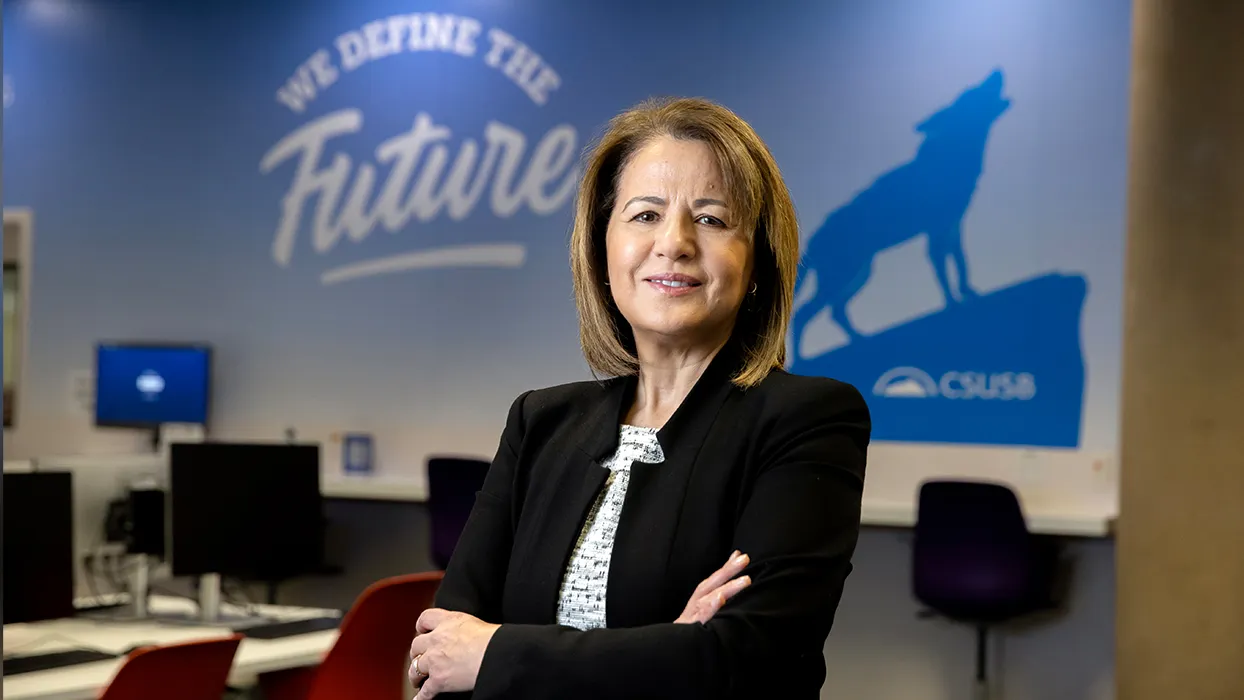Alan Llavore | Office of Marketing and Communications | (909) 537-5007 | allavore@csusb.edu

This fall marks the third anniversary of the Data Analytics Working Group (DAWG) at Cal State San Bernardino — a cross-disciplinary initiative that has become a hub for hands-on learning, collaboration and skill-building in today’s data-driven world.
Founded in fall 2022, DAWG was created to give students, faculty and community members an accessible space to explore data analytics in practical, engaging ways. In just three years, the program has hosted more than 30 interactive workshops — covering topics from artificial intelligence and machine learning to programming in Python and R, data visualization, and applied research analytics — and has engaged numerous participants from across campus.
The vision for DAWG comes from Essia Hamouda, professor of cybersecurity and decision sciences in the Jack H. Brown College of Business and Public Administration, whose career has been dedicated to bridging technical skill gaps and creating inclusive learning environments.
“What inspired me to start DAWG and (the Data Analytics Club) was a simple but powerful realization,” Hamouda said. “Across campus, students were engaging with data, but many lacked the confidence, support or technical skills to go further. I wanted to create a space where anyone, regardless of background, could learn, experiment and grow.”
Hamouda’s work in fostering inclusive technical communities began before DAWG. In 2018, she founded the Women in Cybersecurity (WiCyS) CSUSB chapter to address the gender gap in technology and empower women to lead in cybersecurity.
“What inspired me to start WiCyS was seeing talented female students hesitate to pursue careers in technical fields because they didn’t see themselves represented,” she explained. “I wanted to create a space where they could build confidence, connect with mentors, and realize that they belong in this field.”
She also serves as faculty advisor to the Data Analytics Club (DAC), a student-led organization that complements DAWG’s mission by offering guest speakers, resumé-building workshops, collaborative projects, and peer mentoring — helping students put their skills into action while building professional networks.
Recognizing the challenges many face in mastering technical subjects, Hamouda introduced a graduate-to-undergraduate tutoring model for computer programming courses. By connecting undergraduates with graduate mentors who have strong technical skills, the program provides focused, one-on-one guidance while giving graduate students the chance to develop their teaching expertise.
“Too often, students fall behind in technical courses not because they lack interest or ability, but because they don’t have timely, personalized support,” she said. “By leveraging the strengths of our graduate students as mentors, we help undergraduates succeed while giving our graduate students valuable teaching and communication experience.”
As DAWG enters its fourth year, Hamouda remains committed to its mission of equipping participants with both the confidence and the technical expertise to thrive in a world increasingly shaped by data.
“When students feel supported, empowered, and challenged, they do incredible things,” she said. “That’s what I strive to cultivate every day.”
She also credits the program’s success to the collaborative spirit that has fueled it from the start, noting that DAWG’s achievements would not have been possible without the dedication of her colleagues.
To learn more about the Data Analytics Working Group and the team behind it, visit the Data Analytics Working Group website.